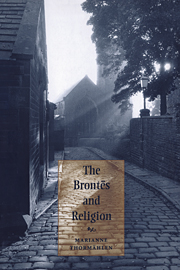Book contents
- Frontmatter
- Contents
- Acknowledgements
- Abbreviations and editions
- Introduction
- I Denominations
- II Doctrines
- Chapter 4 The Brontës in the theological landscape of their time
- Chapter 5 God and his creation
- Chapter 6 Faith and redemption
- Chapter 7 This life and the next
- III Ethics
- IV Clerics
- Notes
- Select bibliography
- Index
Chapter 5 - God and his creation
Published online by Cambridge University Press: 22 September 2009
- Frontmatter
- Contents
- Acknowledgements
- Abbreviations and editions
- Introduction
- I Denominations
- II Doctrines
- Chapter 4 The Brontës in the theological landscape of their time
- Chapter 5 God and his creation
- Chapter 6 Faith and redemption
- Chapter 7 This life and the next
- III Ethics
- IV Clerics
- Notes
- Select bibliography
- Index
Summary
DIVINE AND HUMAN LOVE
Evangelical Christianity in the nineteenth-century Church of England was a profoundly emotional faith. Its exponents were tireless in exhorting believers to give their hearts to God. Discoursing on Divine love, Isaac Watts – another household name in Haworth Parsonage – had stressed that that one passion ‘will influence all the other Affections of the Heart’. God's love for mankind was the fundament on which all religious commitment and activity rested, the first cause in every individual's spiritual peregrination and his/her mainstay to the end. Time and again, an Evangelical divine would remind his readers that ‘God so loved the world, that he gave his only begotten Son, that whosoever believeth in him should not perish, but have everlasting life’ (John 3:16).
This insistence on Divine love was not an exclusively Evangelical phenomenon, however. Directly or indirectly influenced by Coleridge's explorations of the connexions between reason, feeling, belief and experience, theologians in various quarters enquired into the ways in which human hearts are won for God through Christ. What strikes a reader of much early-nineteenth-century devotional literature is the sense of a close and living communion with God, a communion which involves the whole human personality. Religious despair and depression are states induced and exacerbated by a loss of that essential nearness.
These features are present in the Brontë novels, too.
- Type
- Chapter
- Information
- The Brontës and Religion , pp. 53 - 70Publisher: Cambridge University PressPrint publication year: 1999



